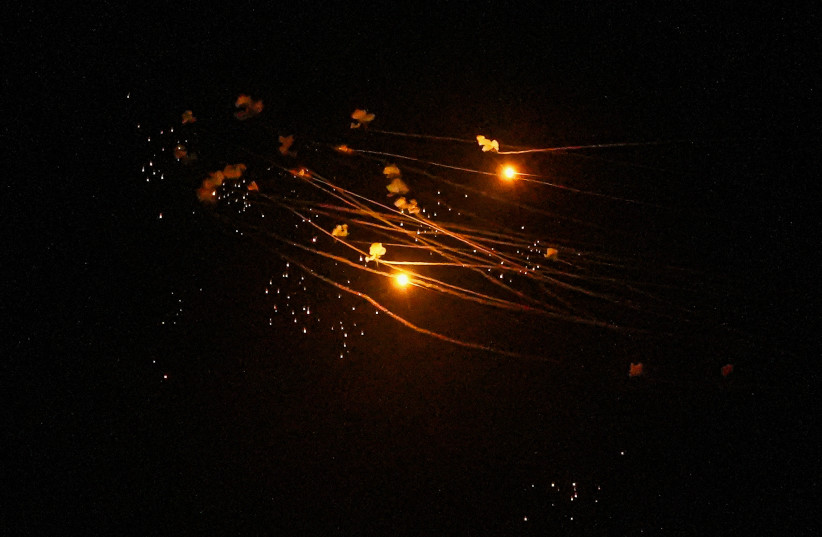Iranian missile barrage: Was it an IDF intel failure masked by air-defense success? – analysis
A staggering intelligence failure by Israeli military intelligence took place on April 1.
IDF intelligence assessed that killing Iran Islamic Revolutionary Guard Corps Quds Force Commander for Lebanon and Syria, Mohammed Reza Zahedi, in the heart of Damascus within a diplomatic compound (though not in the Iranian Embassy to Syria itself) would not lead to a major direct attack on Israel by Iran.
This estimate was dead wrong.
Iran directly and massively attacked Israel for the first time in 45 years after decades of being content with a lower-key shadow war via proxies.
The only reason there are no calls for a commission of inquiry about the colossally inaccurate assessment which led to Iran’s ferocious attack on Israel with around 350 aerial threats, including around 120 ballistic missiles, is that the air force, combined with the US, UK, France, Jordan, and others managed a miraculous shoot down rate that surpassed even the massive failure.

Put differently, due to IDF intelligence underrating the threat posed by an adversary, Israeli losses on April 1 could have been greater than on October 7, and the only difference was the effectiveness of the air force and allied forces.
Why hasn’t IDF intelligence learned since October 7 not to underestimate Israeli adversaries?
First of all, most of the core Israeli defense officials who underestimated Hamas on October 7 have still not resigned and were in place on April 1.
IDF intelligence chief Maj. Gen. Aharon Haliva has essentially committed to quitting, but more than six months after October 7, has not done so.
The same is true about IDF Chief of Staff Lt. Gen. Herzi Halevi, and while IDF Intelligence Analysis Chief Brig. Gen. Amit Saar resigned on April 4 due to health issues, he was still officially in place on April 1. The IDF declined to clarify who exactly was the top IDF analysis official who gave the final prediction for the operation given that Saar was already sick leading into April 1.
Israel’s multi-bodied intelligence system did not pull through
Also, intelligence “pluralism” created by the 1973 Yom Kippur failures did not function properly.
After 1973, the Mossad was given additional resources to establish its own larger analysis division to potentially challenge and compete with IDF intelligence analysis’s assessments.
Although the Mossad was consulted on the question of Iran’s potential response to assassinating Zahedi, Yediot Ahronot’s Nadav Eyal first reported that the agency was not told where the assassination would take place – let alone that it would be in a diplomatic compound.
However, this reporting raised questions about how the Mossad could not have requested to know such critical information before issuing an opinion.
The Jerusalem Post subsequently learned that the Mossad was not consulted at all about its views regarding the assassination the day of, the days before, or even the week before.
Rather, it was consulted in a much more general way, along with a variety of other potential theoretical scenarios around a month before.
In other words, IDF intelligence failed to properly consult the Mossad in the fullest possible fashion to get a second opinion once the more exact circumstances of the assassination became clear.
A second opinion a month before without full knowledge of the circumstances is more of a check-the-box cop-out than showing a real readiness to be challenged by an outside informed voice.
In fairness to IDF intelligence, the circumstances of assassinations of top terror targets are often developing real-time events, and it is not always possible to consult with every level and authority who might weigh in before pulling the trigger – without risking losing the opportunity.
However, in today’s technological age and with the tight multi-level coordination between the IDF and Mossad, it is hard to argue that there would not have been a few minutes for a last-second check.
Another reason IDF intelligence could defend its assessment is that it was absolutely right during a “trial rehearsal” in December 2023 when it assassinated top IRGC commander Sayyed Reza Mousavi, also in Damascus.
At that point, the Islamic Republic decided to stick to the shadow war and only retaliate through proxies or terror against Jews overseas.
But one vital lesson of October 7 was not to assume that even highly consistent patterns of thought and operation will never wildly change.
One of the reasons that IDF intelligence underestimated Hamas’s readiness to risk a larger conflagration was that the Gaza terror group had consistently avoided doing so from 2009-2023, including multiple times in 2022 and 2023, leaving Islamic Jihad to fight the IDF alone.
Overcoming that “bias” that past patterns will always remain consistent was supposed to be one of the great lessons of October 7, but it appears to not have fully taken hold.
Of course, Halevi or the war cabinet could have questioned the conclusion of IDF intelligence analysis, but without a second opinion with which to challenge it, it can be difficult for such officials to second guess “the experts,” especially where there is no obvious political interest involved, and the question really is based on professional expertise.
The Post received a response from the from the IDF, Shin Bet, and the Mossad saying, “According to the convention for cooperation and divisions of responsibility sign in 2005 between the defense establishment bodies, all operational actions in Israel and worldwide have been carried out for years with full cooperation between the Shin Bet, the IDF, and the Mossad.”
“The IDF is prepared for every scenario and prepared for an Iranian attack accordingly,” continued the statement.
Defense sources added that IDF intelligence predicted that Iran would not attack directly but by using proxies. This evaluation was accepted and endorsed by Halevi and the political echelon, though they could have questioned it.





Comments are closed.